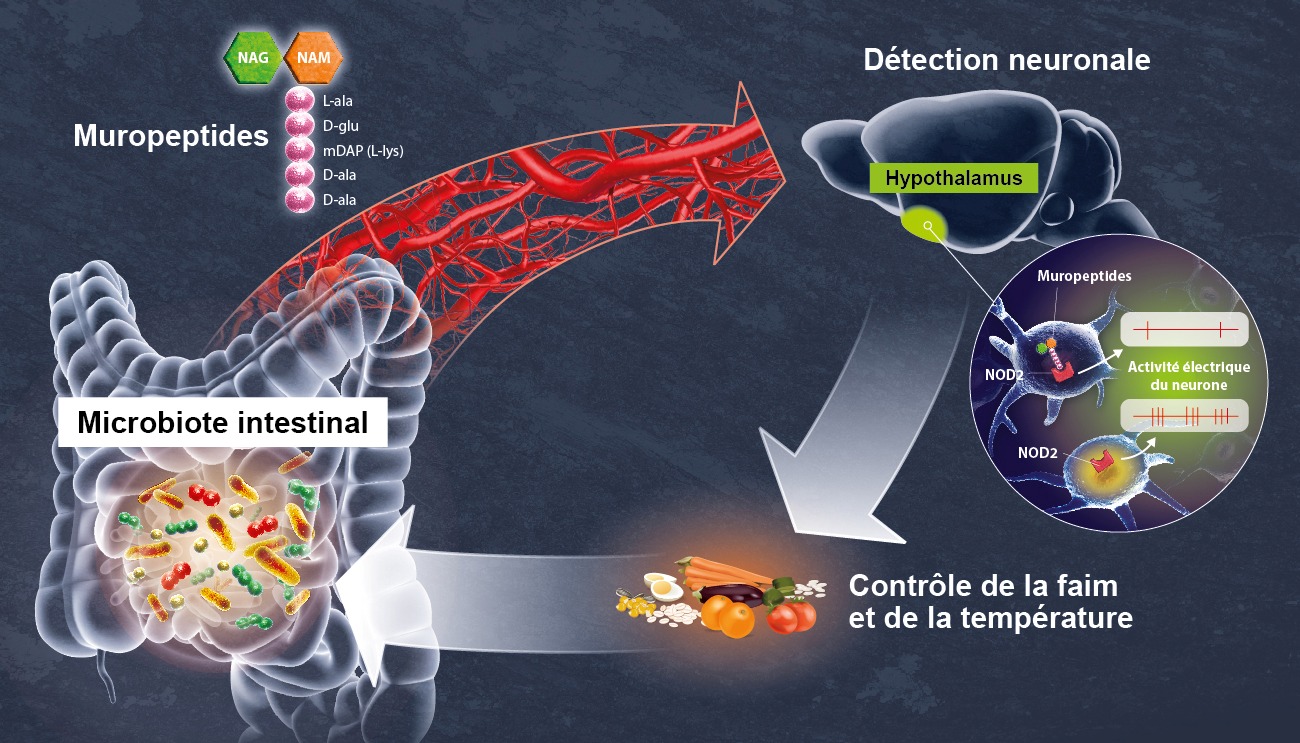Published on 04/19/2022 at 4:25 p.m.,
Reading 2 mins.
A study conducted by a team of scientists from the Institut Pasteur, Inserm and the CNRS studied in mice the mechanism linking microbiota and neurons of the hypothalamus, particularly in the regulation of appetite and body temperature.
The link between the intestines and the brain no longer needs to be proven. Scientists are still discovering the extent of the connections between these two systems, dependent on each other, which could explain certain diseases such as diabetes or obesity. Their results are published in the journal Science.
The NOD2 receptor has been studied in particular
In this work, the researchers focused on the NOD2 receptor, present among other things, in immune cells. Ivo G. Boneca, head of the Biology and Genetics of the Bacterial Wall unit at the Institut Pasteur, admits to having started from an observation: “We noticed that mice lacking the NOD2 receptor were overweight, especially older females.”.
Scientists then ask themselves the question of a link and work on these receptors. “We therefore sought to find out where this receptor was expressed and we were surprised to find it in the brain, within the hypothalamus, this cerebral gland which governs elements such as body temperature or satiety. adds the scientist.
A receptor that detects gut bacteria
Using brain imaging techniques, the team of researchers therefore found that bacterial wall compounds, which can be considered as elements derived from the intestinal microbiota – and called muropeptides by the authors of the study – were detected by the NOD2 receiver.
“Muropeptides present in the gut, blood and brain are considered markers of bacterial proliferation. adds Ivo G. Boneca. In the case where the NOD2 receptor is defective, as in old female mice, these neurons are no longer repressed by the muropeptides; the brain then loses control of food intake and body temperature.

Normally, food consumption induces an expansion of the intestinal microbiota. This expansion is followed by an increase in the release of muropeptides by intestinal bacteria. When these muropeptides reach the brain, they target a subset of hypothalamic inhibitory neurons. In older women, activation of neuronal Nod2 receptors by these muropeptides decreases neuronal activity, which in turn helps regulate satiety and body temperature.
A link not yet established in humans
This discovery, although it is valid on the mouse only for the moment, nevertheless remains promising for the scientists. “Indeed, we already know that the NOD2 receptor is associated with other pathologies of both systems, both digestive, as in Crohn’s disease, but also in the cerebral system, with a function in bipolar disease” further clarifies Ivo G. Boneca.
NO to diets, YES to WW!
Avoid diabetes and obesity in older women
The objective for the authors is now to transpose their conclusions to humans. “We need to continue our research to study the effects of this receptor and the intestinal mocrobiota in humans. The next step is to select a cohort to study the same phenotype as in mice, namely the elderly and overweight woman. The objective would be to achieve an understanding of this mechanism of deregulation which intervenes with age in order to fight against it, before it is triggered or why not by acting on the microbiota” concludes the head of the Biology and Genetics of the Bacterial Wall unit at the Institut Pasteur. This could prevent the installation of pathologies such as diabetes or obesity in these women.
